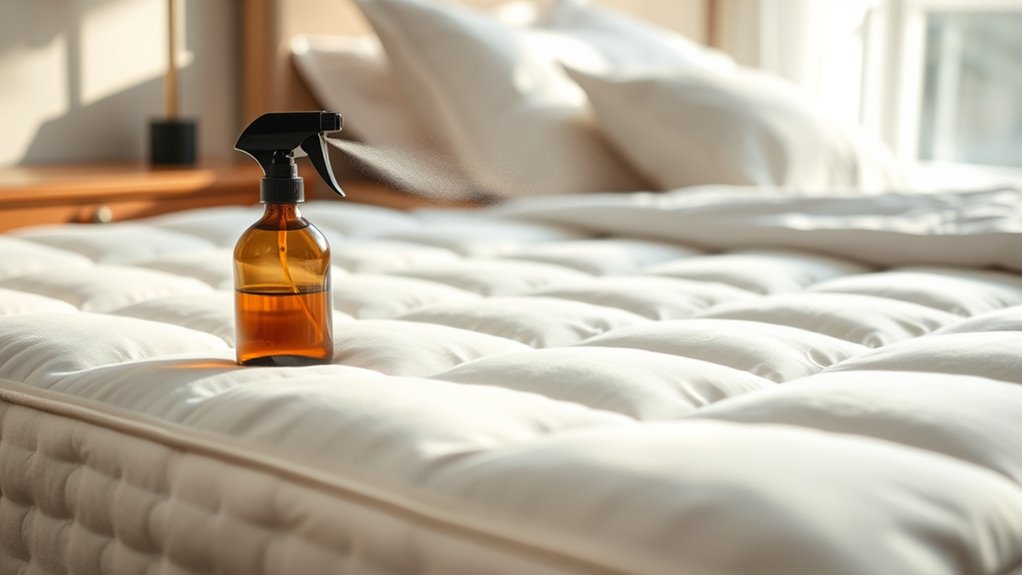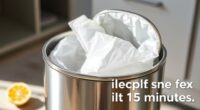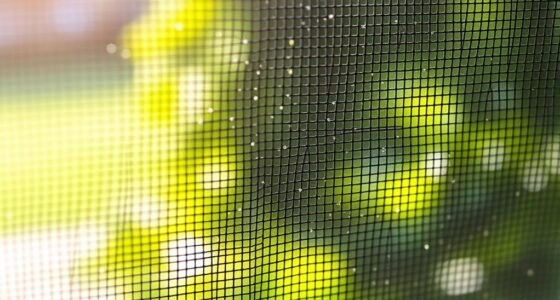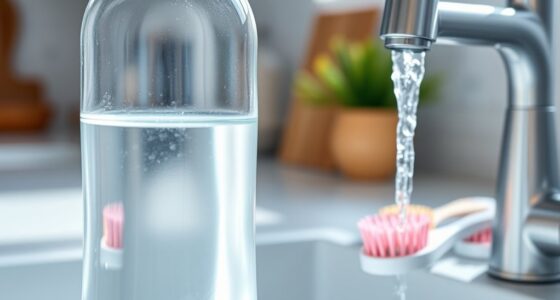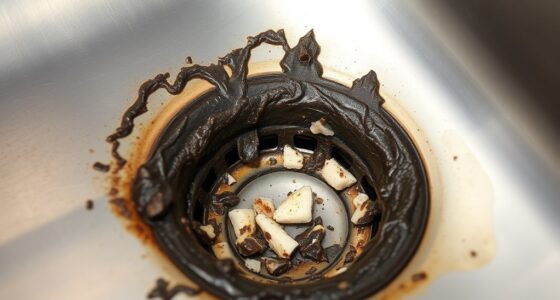To keep your mattress smelling fresh for longer, use natural enzymes or sprinkle baking soda, letting it sit overnight before vacuuming. Choose commercial products designed for mattresses that neutralize odors and inhibit bacteria, following instructions carefully. Avoid overusing harsh chemicals or DIY remedies like vinegar, which can damage fabrics or promote mold. Maintaining good ventilation, changing bedding regularly, and using protective covers help sustain a odor-free environment—discover more tips to guarantee lasting freshness.
Key Takeaways
- Use enzyme-based sprays and baking soda, applied correctly and allowed to sit overnight, for long-lasting odor removal.
- Ensure proper ventilation to dry the mattress and prevent moisture buildup that causes persistent odors.
- Regularly clean and rotate your mattress, and wash bedding weekly to maintain freshness over time.
- Avoid harsh chemicals and untested DIY remedies, which can damage the mattress and trap odors deeper inside.
- Use mattress-specific odor-neutralizing products with antimicrobial properties to sustain a fresh, odor-free sleep environment.
Proven Natural Deodorizing Techniques
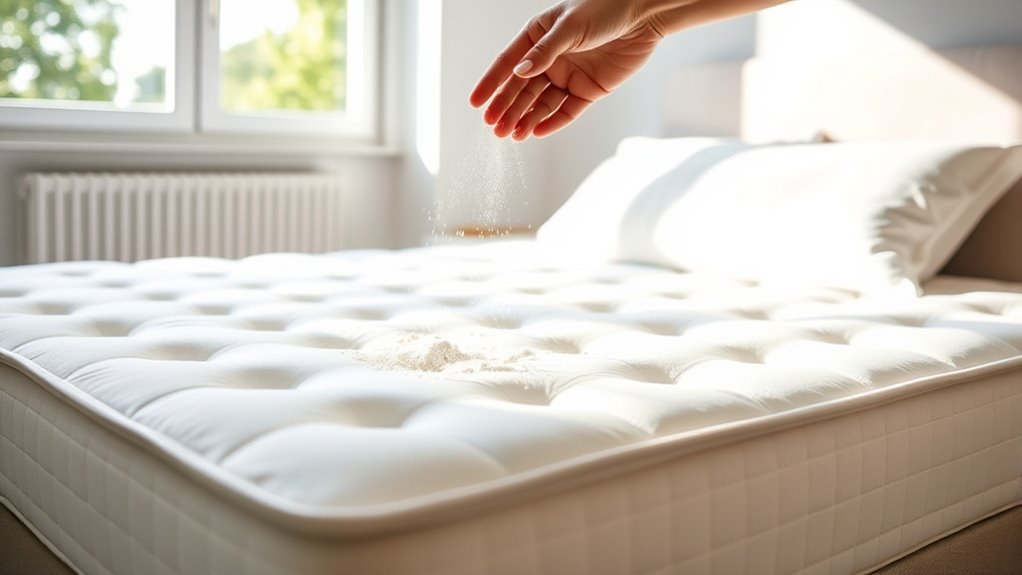
When it comes to deodorizing your mattress naturally, several proven techniques can effectively eliminate odors without harsh chemicals. One of the most effective methods involves using natural enzymes, which break down organic molecules causing smells. You can find enzyme-based sprays designed specifically for mattresses or create your own with household ingredients. These enzymes work by digesting odor-causing bacteria and stains, leaving your mattress fresh. Additionally, odor neutralizers like baking soda are classic choices; they absorb moisture and odors overnight. To use, sprinkle baking soda evenly across the surface and let it sit for several hours or overnight before vacuuming thoroughly. Incorporating proper ventilation practices can further help in maintaining a fresh sleeping environment. Combining natural enzymes and odor neutralizers offers a safe, eco-friendly way to keep your mattress smelling clean and fresh without relying on synthetic chemicals.
Effective Commercial Products for Long-Lasting Freshness
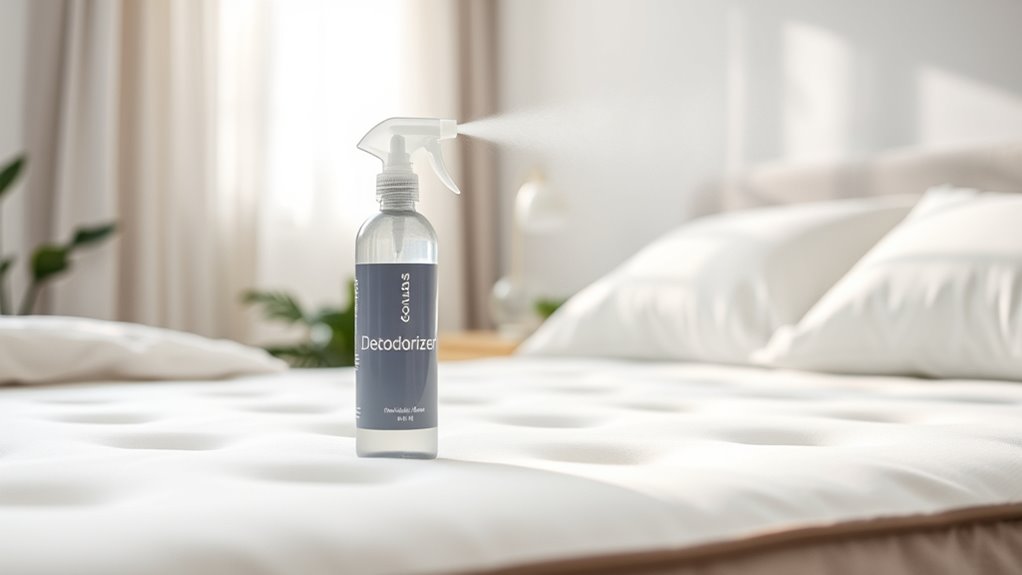
For long-lasting freshness, commercial deodorizing products offer convenient and effective solutions that can keep your mattress smelling clean over time. These products are designed to enhance mattress cleaning and provide odor prevention, ensuring unpleasant smells don’t return quickly. Look for sprays or powders formulated specifically for mattresses, as they target deep-seated odors rather than just masking them. Many contain odor-neutralizing agents that bind to odor molecules, offering lasting freshness. Additionally, some products include antimicrobial properties to inhibit bacteria growth, which can cause odors. When used correctly, commercial deodorizers make it easier to maintain a fresh-smelling mattress with minimal effort. Always follow the manufacturer’s instructions for ideal results and to avoid damaging your mattress’s fabric or inner layers. Incorporating Odor-Reduction Techniques can further improve the longevity of your mattress’s fresh smell.
Common Mistakes That Can Worsen Odors

Using harsh chemicals too often can damage your mattress and trap odors. Ignoring proper ventilation lets moisture and odors build up instead of escaping. Relying only on sprays might mask smells temporarily but won’t eliminate the source, making odors worse over time. Additionally, selecting vetted products designed specifically for mattresses can ensure safe and effective deodorizing without causing damage.
Overusing Harsh Chemicals
Overusing harsh chemicals to eliminate odors can actually make the problem worse. Strong cleaners or sprays can cause chemical burns on your mattress and skin irritation on your skin. These chemicals may temporarily mask odors, but they can damage the mattress fibers over time, trapping odors deeper inside. Plus, lingering chemical residues can cause allergic reactions or skin irritation, especially if you sleep directly on the surface. Instead, opt for natural solutions like baking soda or mild vinegar solutions. Using too much chemical cleaner not only risks damaging your mattress but also compromises your health. Always follow instructions carefully, and test a small area first. Remember, less is more when it comes to chemical use for deodorizing. Necessary cookies help ensure that your personal preferences are respected during this process.
Ignoring Proper Ventilation
Neglecting proper ventilation can considerably worsen mattress odors, even if you’ve used natural cleaning methods. Without sufficient air circulation, trapped moisture and lingering smells can intensify, making odors harder to eliminate. Effective airflow management helps dry out the mattress and remove airborne particles that contribute to bad smells. Failing to ventilate properly can also cause mold and bacteria growth, which worsen odors over time. To avoid this, open windows regularly and use fans to promote airflow around your mattress. Avoid covering your bed without allowing fresh air to circulate; this traps odors and moisture. Good air circulation is essential to keep your mattress fresh and prevent odors from becoming persistent. Proper ventilation is a simple yet vital step in maintaining a clean, odor-free mattress.
Relying Solely on Sprays
Relying solely on sprays to eliminate mattress odors can often make the problem worse if not combined with other cleaning methods. Chemical sprays might mask odors temporarily but don’t remove the underlying cause, leading to persistent smells. Enzyme treatments are more effective for organic stains and odors, breaking down bacteria and proteins that cause odors. However, using sprays alone, without proper cleaning or airing out your mattress, limits their effectiveness. Overuse of chemical sprays can also introduce new odors or irritate your skin and respiratory system. To truly deodorize your mattress, combine the use of enzyme treatments with thorough cleaning, ventilation, and targeted odor removal techniques. This all-encompassing approach ensures odors are eliminated rather than masked, providing a fresher and healthier sleep environment. Incorporating proper ventilation can significantly enhance odor removal and improve overall air quality around your mattress.
Safe Practices for Regular Mattress Maintenance
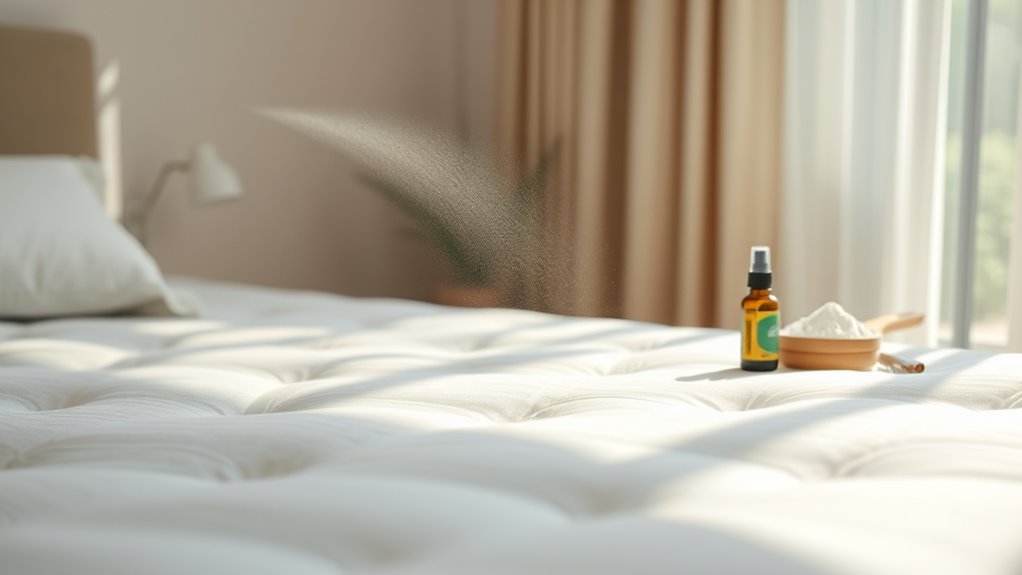
Maintaining your mattress regularly is essential to keep it fresh and odor-free. Start with routine mattress cleaning by vacuuming the surface to remove dust, dirt, and allergens. Use a gentle scrub brush to spot clean stains with a mild detergent. Regularly flipping or rotating your mattress helps prevent uneven wear and prolongs its lifespan. When it comes to bed bug prevention, inspect your mattress and box spring frequently, especially around seams and tags. Encase your mattress in a protective cover to block pests and reduce odors. Avoid harsh chemicals that might damage the fabric or pose health risks. Instead, stick to gentle, natural products and maintain good hygiene habits—like washing bedding weekly—to keep your mattress clean, fresh, and bed bug-free. Incorporating proper ventilation can also help dissipate odors and keep your mattress in better condition over time.
DIY Remedies You Should Avoid
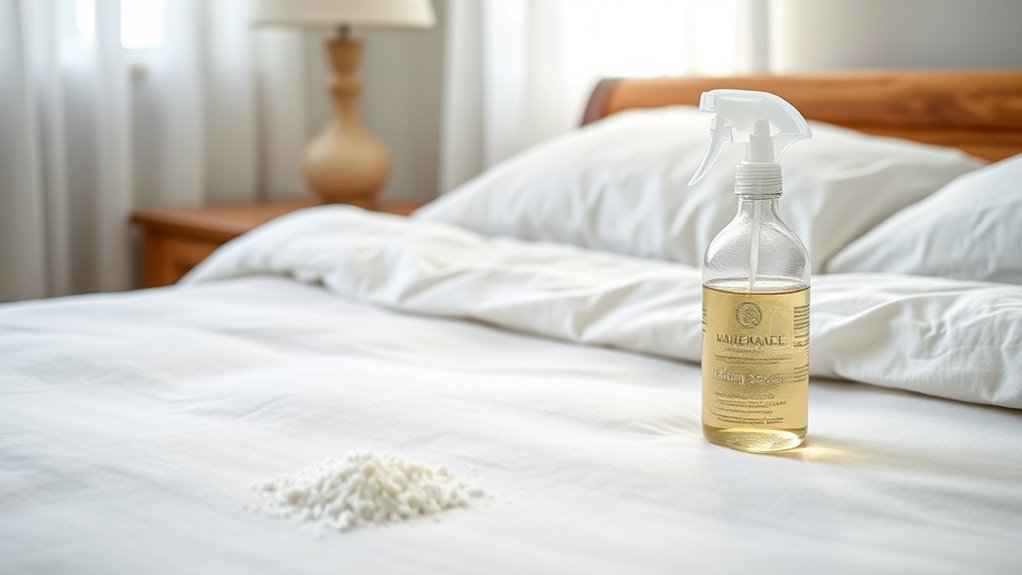
While regular cleaning helps keep your mattress fresh, some DIY remedies can do more harm than good. Avoid using homemade sprays with essential oils or other homemade concoctions that haven’t been tested. Essential oils might seem like a natural solution, but they can stain fabrics or cause allergic reactions. Homemade sprays often contain alcohol or unknown ingredients that may damage your mattress’s fabric or create lingering odors. Spraying vinegar or baking soda directly onto the mattress can also lead to moisture buildup, encouraging mold growth. Additionally, DIY remedies may not eliminate the source of odors and could make the problem worse. Stick to proven cleaning methods and products designed specifically for mattresses to guarantee safety and effectiveness. Avoid shortcuts that could compromise your mattress’s integrity or your health. Using appropriate mattress accessories can also help maintain freshness and longevity of your mattress.
Tips for Maintaining a Odor-Free Sleeping Environment
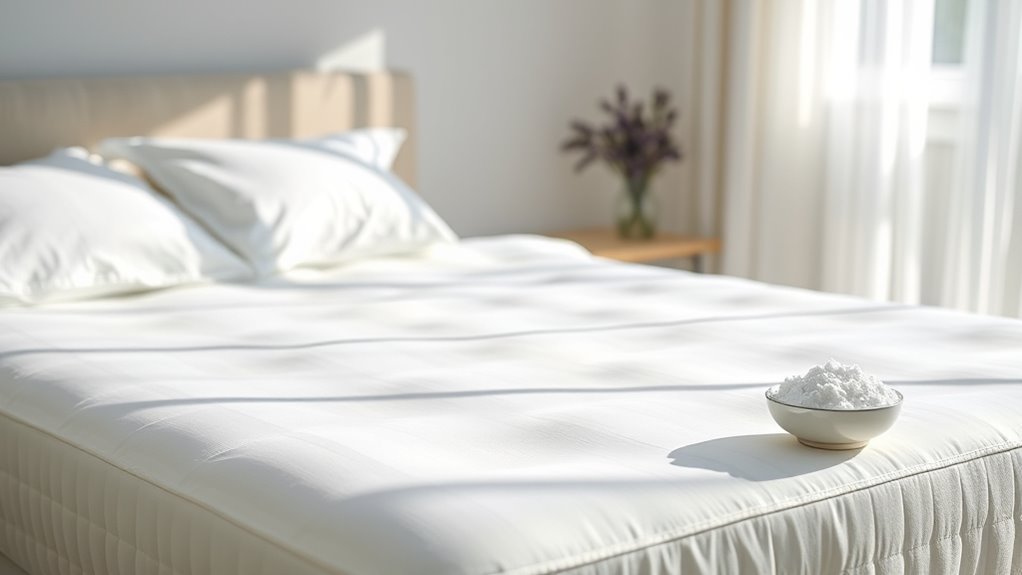
To keep your sleeping environment fresh, change your bedding regularly to prevent buildup of odors and allergens. Make sure your room is well-ventilated daily to reduce moisture and lingering smells. These simple steps help maintain a clean, odor-free space for restful sleep. Using an air purifier with HEPA filters can further improve air quality by removing airborne particles that contribute to odors and allergens.
Regular Bedding Changes
Have you ever noticed how quickly bedding can start to smell after just a few nights? Regularly changing your sheets prevents the buildup of sweat, oils, and dead skin cells that contribute to odor. When you delay washing, chemical reactions occur between these residues and moisture, intensifying unpleasant smells. Additionally, allergen buildup from dust mites and pollen can worsen odors and trigger allergies. By switching your bedding weekly, you disrupt these processes, reducing odor-causing bacteria and allergens. Fresh sheets also help maintain a cleaner, healthier sleeping environment. Remember, consistent bedding changes not only improve your comfort but also extend the life of your mattress, keeping odors at bay and ensuring a fresher sleep space every night. Incorporating bedding hygiene practices can further enhance odor control and overall sleep quality.
Proper Ventilation Techniques
Regular bedding changes help reduce odors by removing sweat, oils, and allergens, but proper ventilation is key to maintaining a fresh sleeping environment over time. To optimize airflow, open windows regularly to promote natural ventilation and reduce humidity that can cause odors. Using fans or air purifiers can further enhance airflow optimization, helping fresh air circulate and disperse trapped odors. Maintain a consistent ventilation frequency—aim for daily or at least every few days—to prevent stale air buildup. Avoid blocking vents or keeping windows closed for extended periods, as this can trap odors and moisture. Incorporating proper ventilation techniques can significantly improve air quality and help eliminate persistent odors. By implementing these ventilation techniques, you help keep your mattress fresh, odor-free, and healthier for better sleep quality.
Frequently Asked Questions
How Often Should I Deodorize My Mattress for Best Results?
You should deodorize your mattress every three to six months for ideal mattress maintenance and odor prevention. Regular deodorizing helps keep your sleep environment fresh and extends your mattress’s lifespan. If you notice lingering odors or spills, don’t wait—deodorize sooner. Using natural methods like baking soda can be effective, but avoid harsh chemicals. Consistent deodorizing ensures your mattress stays clean, fresh, and comfortable for restful sleep.
Can Mattress Deodorizing Products Harm Allergy Sufferers?
Yes, some mattress deodorizing products can harm allergy sufferers, especially if you’re sensitive to chemicals. These products may contain fragrances or harsh chemicals that trigger allergy symptoms or chemical sensitivities. To protect yourself, opt for natural, fragrance-free options or homemade remedies like baking soda. Always read labels carefully and ventilate your room afterward to reduce exposure to potential allergy triggers and guarantee a safe, fresh sleeping environment.
Are There Eco-Friendly Options for Long-Lasting Mattress Freshness?
Yes, you can find eco-friendly options for long-lasting mattress freshness. Natural remedies like baking soda, essential oils, and charcoal offer sustainable solutions that deodorize effectively without harming the environment. These options are safe, non-toxic, and cater to those seeking greener choices. By choosing natural remedies, you promote sustainability while maintaining a fresh, odor-free mattress, ensuring comfort and eco-consciousness go hand-in-hand for your long-term bedding health.
How Do I Remove Stubborn Odors From Memory Foam Mattresses?
To remove stubborn odors from your memory foam mattress, start by ventilating the room and exposing the mattress to fresh air. Use an odor absorption method like sprinkling baking soda evenly over the surface, letting it sit for several hours or overnight. Then, vacuum thoroughly to lift the baking soda and trapped odors. Remember, avoid harsh chemicals, and consider using eco-friendly products compatible with your mattress materials for long-lasting freshness.
Is Professional Mattress Cleaning Necessary for Odor Removal?
Professional cleaning isn’t always necessary for odor removal, but it can be highly effective, especially if odors persist after regular treatments. It provides deep cleaning and odor prevention, targeting hidden bacteria and allergens that cause smells. If you’ve tried DIY methods without success, investing in professional cleaning can restore freshness and prolong your mattress’s lifespan. Regular maintenance and proper hygiene also help prevent future odors, making professional services a worthwhile option when needed.
Conclusion
By now, you’ve learned the secrets to keeping your mattress fresh and odor-free. But beware—some common practices might secretly sabotage your efforts, leaving you puzzled by stubborn smells. Are you truly safe from hidden pitfalls? The next step could change everything, revealing a simple tweak that guarantees lasting freshness. Stay alert—your perfect, odorless sleep environment is closer than you think, if you just know what to do—and what to avoid.
